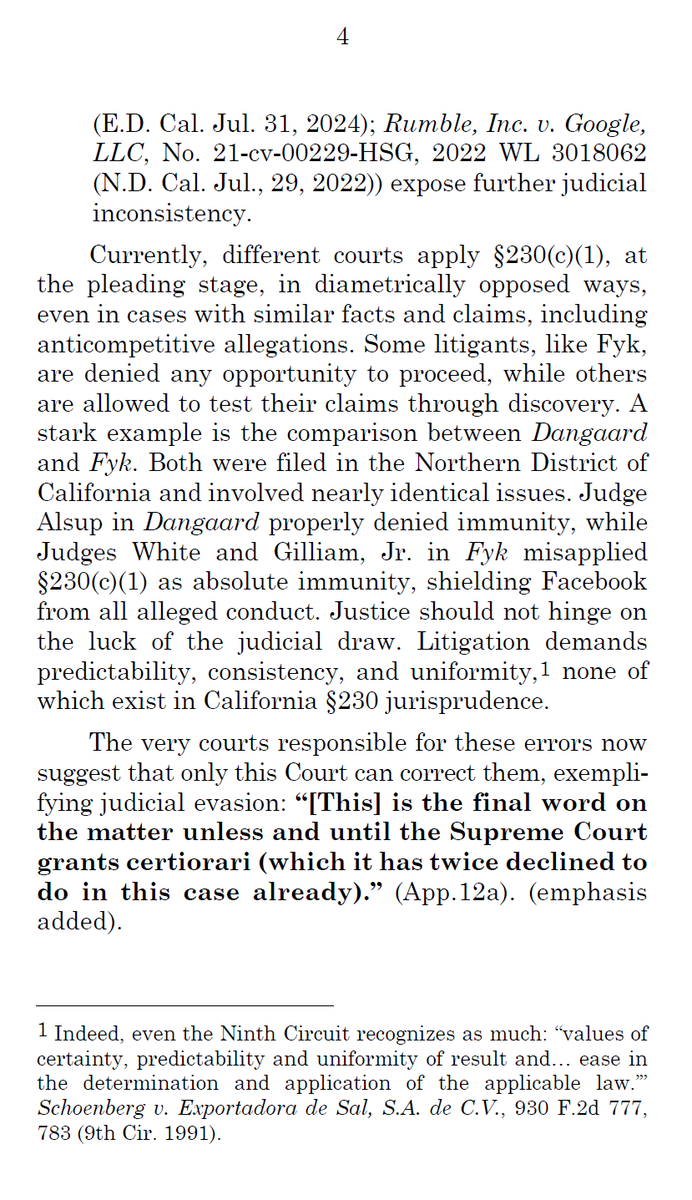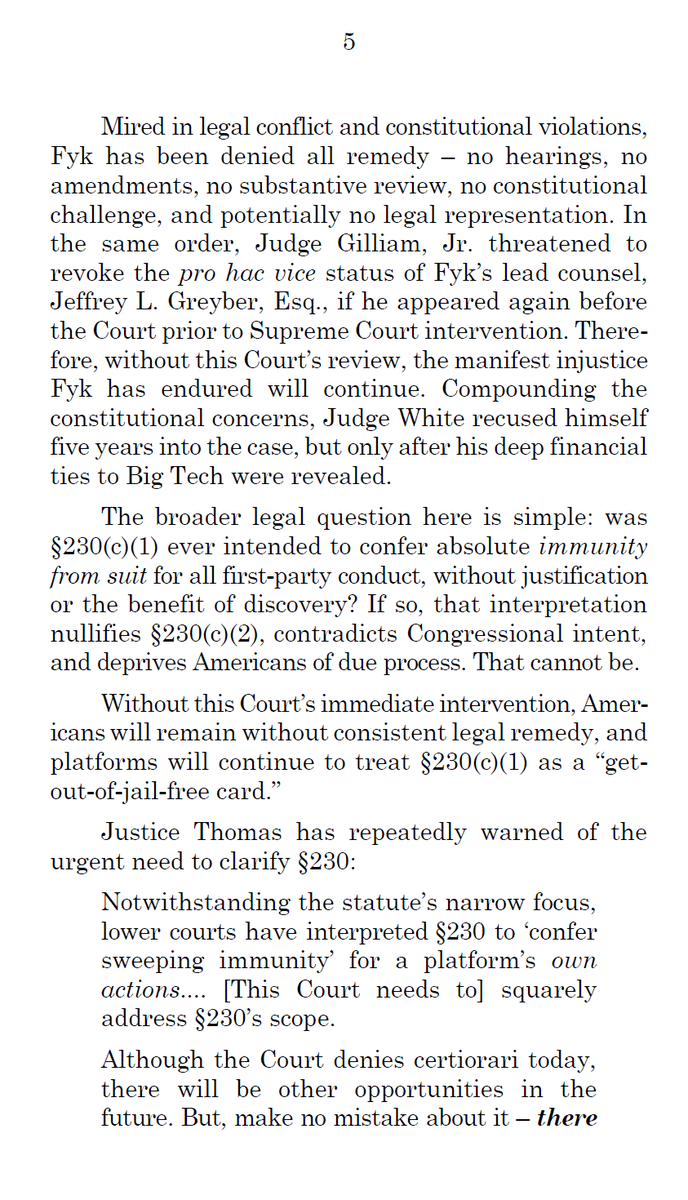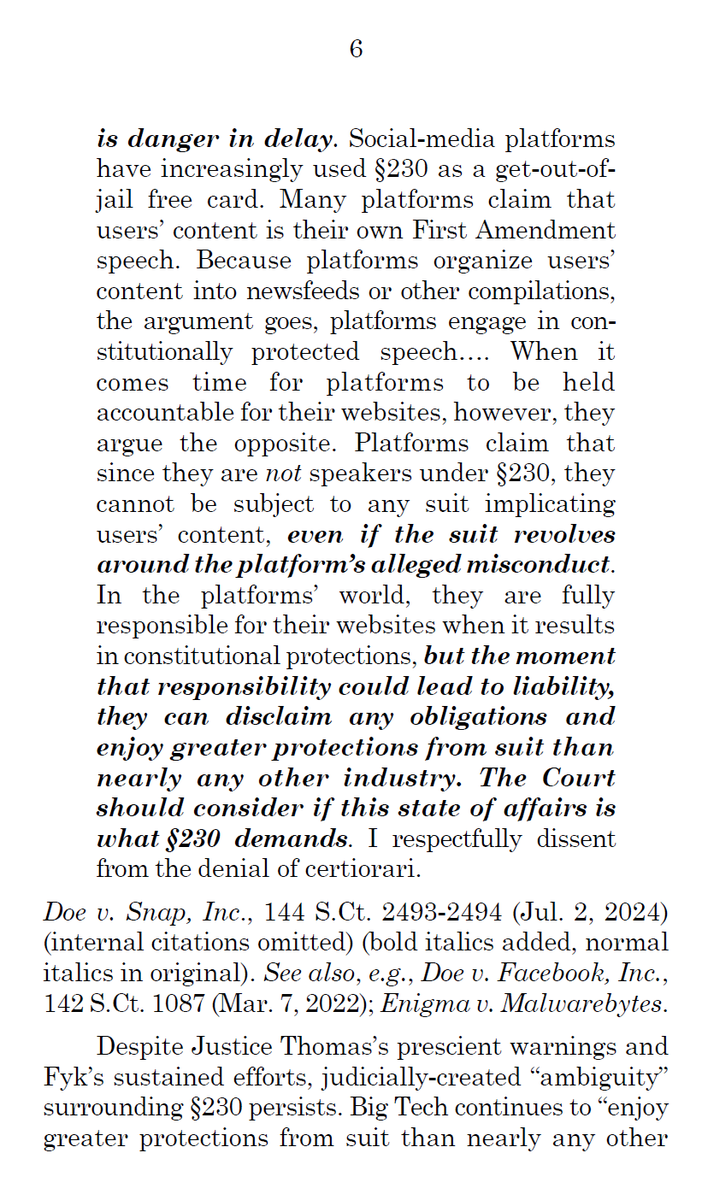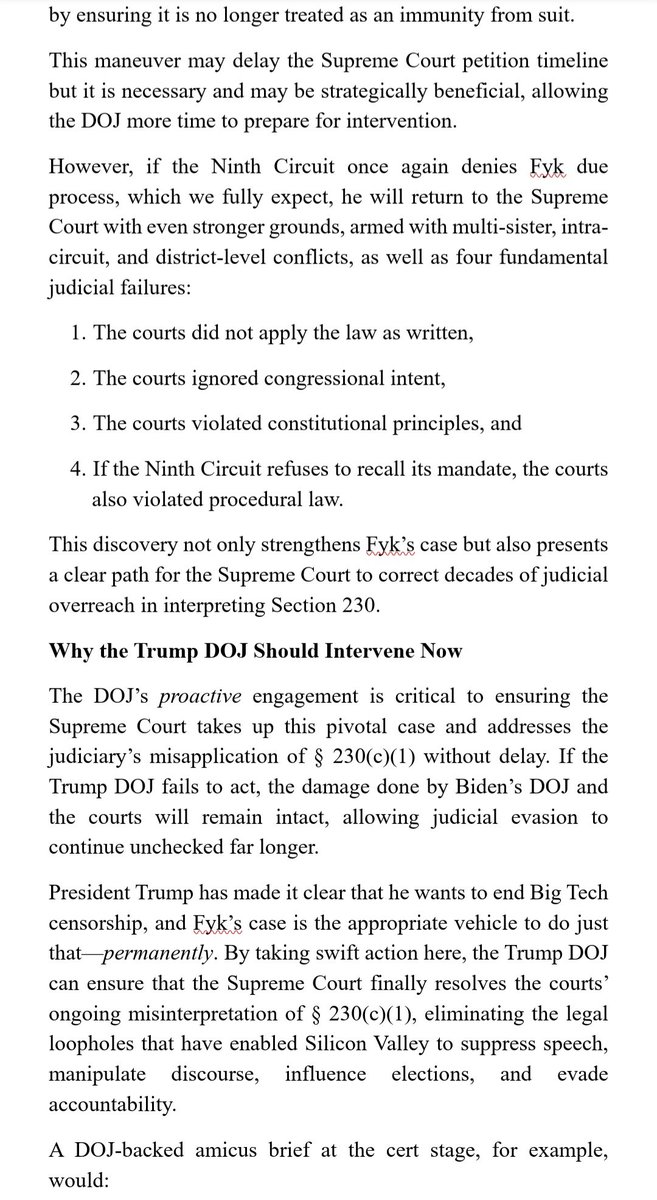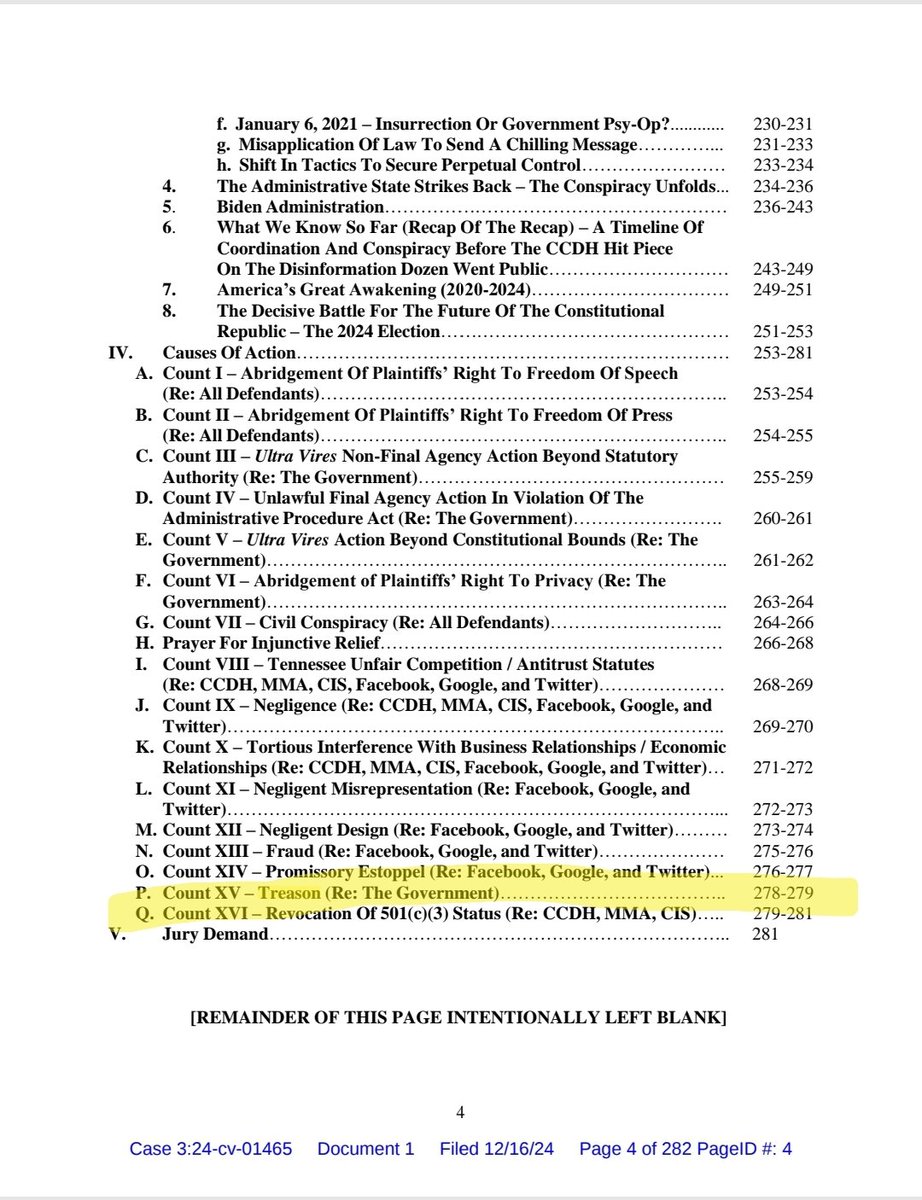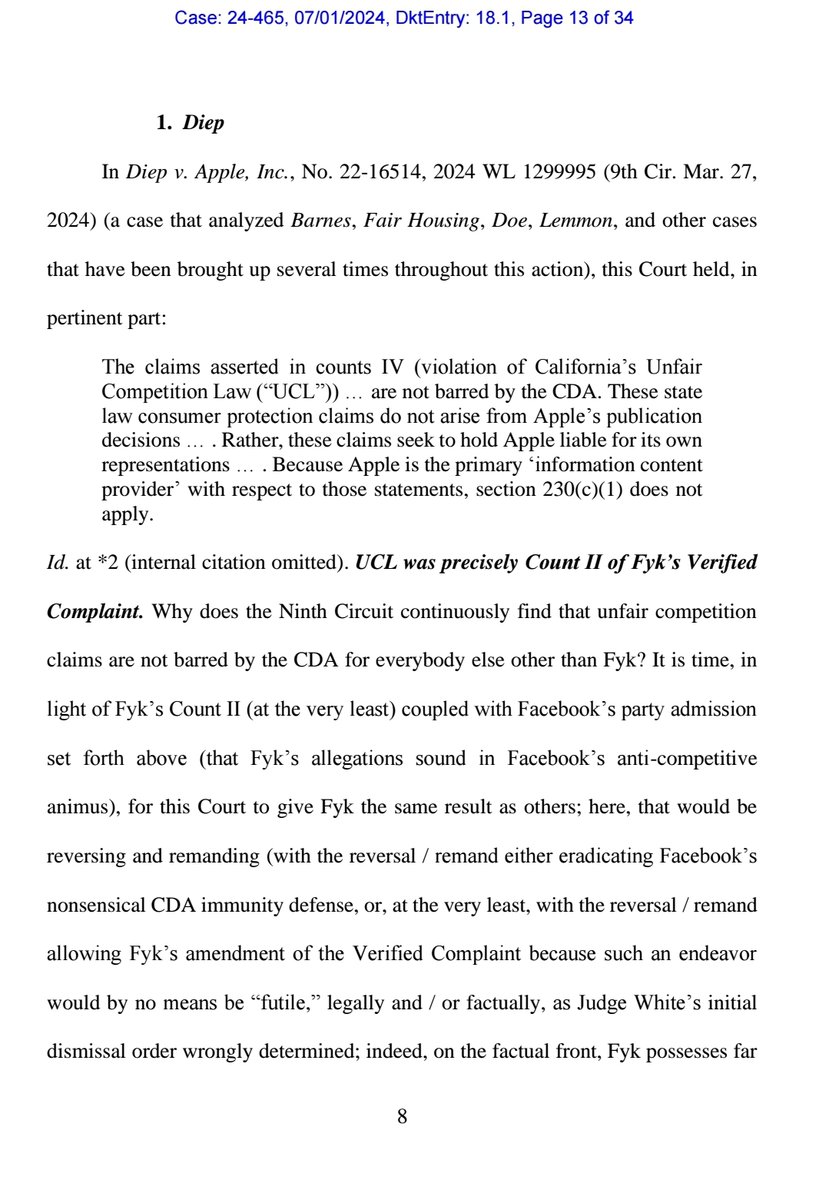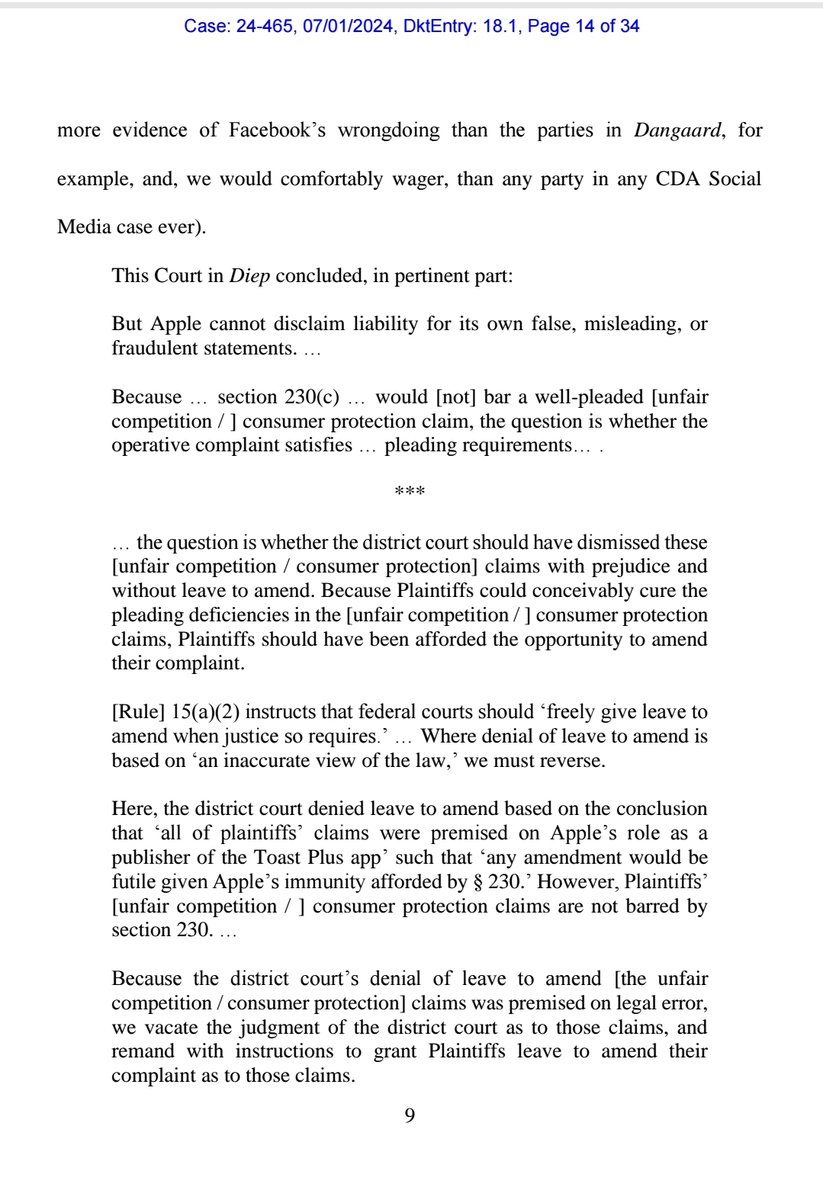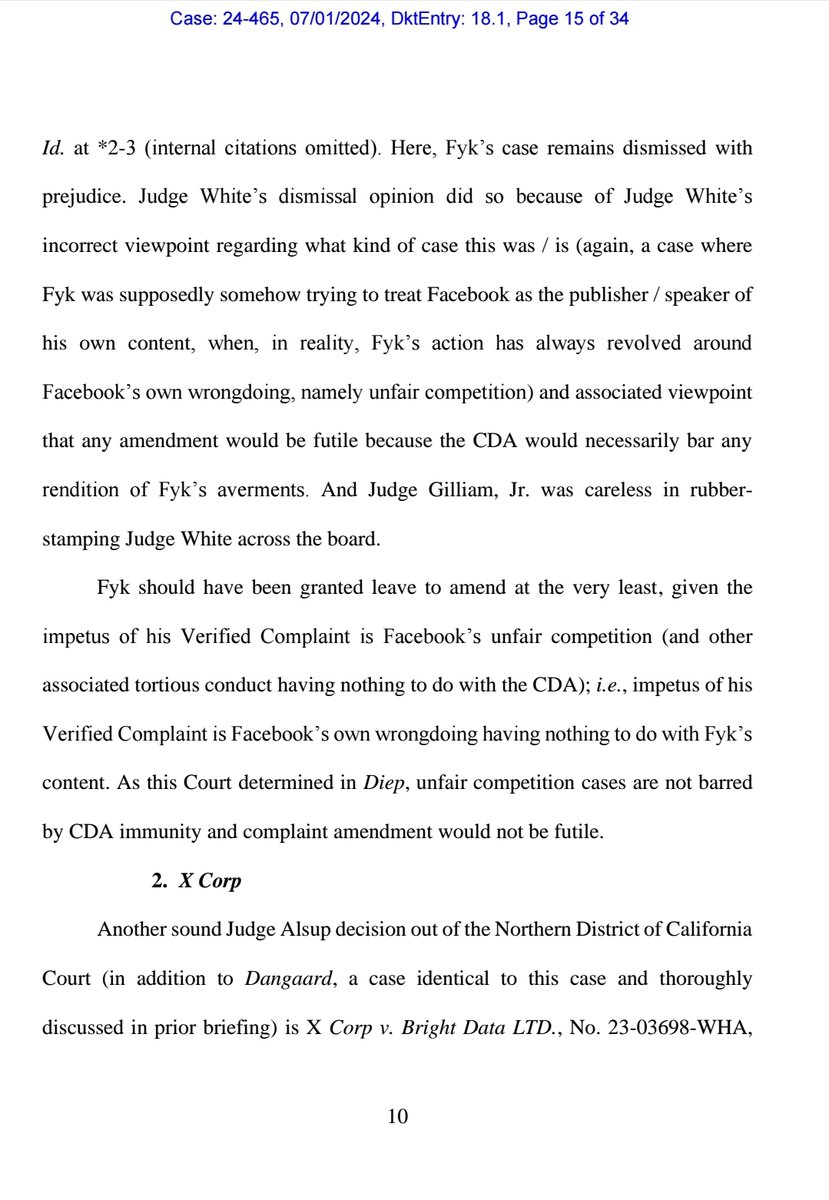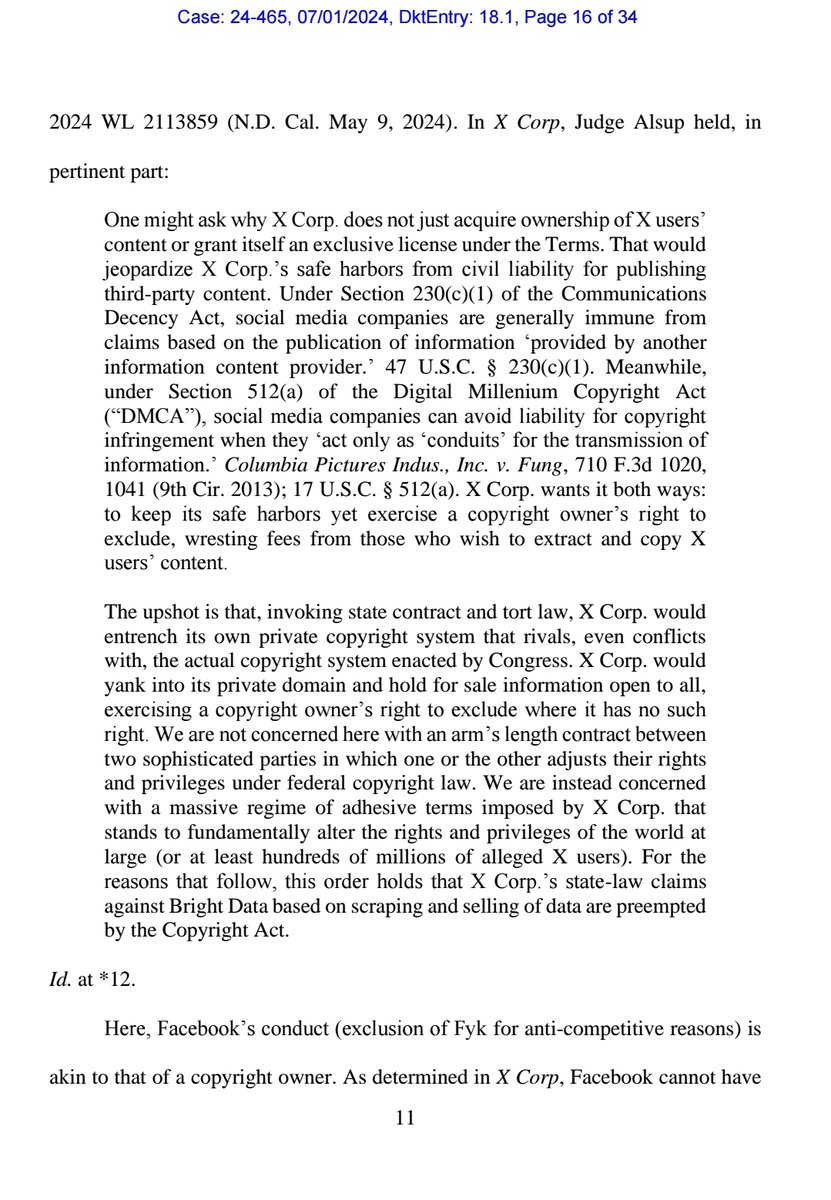I had to lose the battle to win the Big Tech war (must read*)
Since its enactment in 1996, Section 230 of the Communications Decency Act has been instrumental in shaping the internet—but not in the way it was intended. The law was designed to shield social media platforms from being treated as “the publisher or speaker” of information provided by others, ensuring they wouldn’t be punished for merely hosting content passively. However, almost from the start, courts—particularly in California—misinterpreted Section 230(c)(1), setting a dangerous precedent that granted Big Tech almost unlimited immunity for its own publishing conduct, regardless of motive. This misapplication has not only denied individuals their right to free speech and their constitutional right to due process but has also rendered Section 230(c)(2) effectively meaningless. This interpretation strips ordinary users like you and me of any chance to seek legal recourse, leaving us powerless to challenge unjust content moderation decisions and effectively silencing our voices.
For six years, we’ve fought to realign Section 230 with its original statutory text, the Congressional “Good Samaritan” provision, and the Constitution. Initially, our arguments were dismissed by courts relying on flawed precedent, with procedural roadblocks used to avoid addressing the core issue. But the courts can no longer ignore the constitutional challenge we’ve now raised. This is no longer just about bad legal interpretations—this is a non-forfeitable constitutional battle for the future of free speech on the internet.
Ironically, I had to lose my case for my due process rights to be "concretely and particularly" denied by the government, which finally gave me standing to challenge the law itself. In other words, I had to lose the battle to win the war. Most don’t realize how crucial this case truly is. If we succeed, it will fundamentally reshape the internet. For over two decades, Section 230 has been weaponized as leverage over Big Tech. While many believe the government’s control over Big Tech lies in the threat of amending or revoking the law, the real threat comes from the correct and consistent application of Section 230. This threat of antitrust exposure poses an existential risk to platforms like Facebook — something even Mark Zuckerberg has acknowledged.
Big Tech faces massive liability exposure due to deliberate choices—structuring their algorithms around surreptitious information content provision, particularly within their anticompetitive advertising models. Had they wanted to avoid liability, they should have acted as neutral arbiters, focusing on removing objectionable material in good faith, as Congress intended, rather than making content development decisions driven by their own or, in some cases, the government’s interests.
Courts currently apply Section 230(c)(1) both correctly and incorrectly, leading to wildly inconsistent outcomes. A glaring example is the nearly identical cases of Dangaard v. Instagram and Fyk v. Facebook. Despite the fact patterns being virtually the same, and both cases being decided under the same law in the same district court, they reached opposite conclusions. This inconsistency stems from courts arbitrarily deciding what constitutes a material contribution to content development, which has led to conflicting interpretations of what separates passive hosting from active content provision. Because no court has definitively drawn the line between these two roles, judges are left to make inconsistent rulings. The Supreme Court had the opportunity to address this critical issue in Google v. Gonzalez, but ultimately failed to act, leaving the legal landscape as unclear as ever.
We’ve already been to the Supreme Court twice, but they denied hearing our case both times, likely not grasping the magnitude of the issue. Resolving this case would set a clear content development hardline, finally ending the ambiguity in how Section 230 is applied. The current ambiguity gives the establishment leverage over Big Tech, allowing them to selectively apply Section 230(c)(1) to shield companies from antitrust liability when convenient or expose them to it when necessary to invoke censorship behavior. This is not how the law should be applied in a constitutionally sound society.
If we succeed in defeating the dismissal and realigning Section 230 with its original intent, Big Tech will no longer be able to act as both a service provider and an unaccountable publisher. Their decisions to remove content will finally be subject to a "good faith" assessment by a jury, leading to a significant reduction in arbitrary censorship. Platforms will no longer be able to moderate content without consequence, risking liability for bad faith moderation decisions. While this wouldn’t necessarily remove their right to moderate content (as protected by the First Amendment), it would however force a massive behavioral shift, driven by the financial risks associated with reckless content moderation.
The good news is that our case is now finally heading to oral arguments after six years of litigation. Previous proceedings were dismissed without proper review, but now the courts can no longer avoid addressing our non-forfeitable constitutional challenge. Strangely, the original judge presiding over the case voluntarily recused himself without explanation—only for it to later be revealed that he held millions in tech stocks at material times. The new judge, an Obama appointee, then dismissed my challenge without any review, falsely claiming it was “free-standing,” despite our referencing DE51 as the source of the challenge and there being an open, active concurrent motion. Willfully denying someone their rights is an impeachable offense.
Fortunately, the Ninth Circuit appears to be taking my case much more seriously now. In an unprecedented move, they relocated the case from San Francisco to San Jose, and now to Pasadena. A concrete date has been set for our first hearing on the proper application of Section 230 - scheduled for November 22, 2024 at 9:30 AM in courtroom 1. Interest in the case has already surged, and there is a good chance the hearing will be streamed live.
As we prepare for oral arguments, it seems we’ve already succeeded in forcing the long-overdue conversation around fixing Section 230 to the forefront. This may be why figures like Hillary Clinton are now calling for its repeal. The establishment knows that once the ambiguity in the law is removed, they “will lose control” over Big Tech - and free speech will finally be restored. Platforms will be forced to reconsider their censorship practices, scaling back their discretionary power if they want to survive the wave of liability that follows. This is the endgame - a carefully crafted war strategy to save free speech on the internet, six years in the making. Make Free Speech Free Again (MFSFA).
Since its enactment in 1996, Section 230 of the Communications Decency Act has been instrumental in shaping the internet—but not in the way it was intended. The law was designed to shield social media platforms from being treated as “the publisher or speaker” of information provided by others, ensuring they wouldn’t be punished for merely hosting content passively. However, almost from the start, courts—particularly in California—misinterpreted Section 230(c)(1), setting a dangerous precedent that granted Big Tech almost unlimited immunity for its own publishing conduct, regardless of motive. This misapplication has not only denied individuals their right to free speech and their constitutional right to due process but has also rendered Section 230(c)(2) effectively meaningless. This interpretation strips ordinary users like you and me of any chance to seek legal recourse, leaving us powerless to challenge unjust content moderation decisions and effectively silencing our voices.
For six years, we’ve fought to realign Section 230 with its original statutory text, the Congressional “Good Samaritan” provision, and the Constitution. Initially, our arguments were dismissed by courts relying on flawed precedent, with procedural roadblocks used to avoid addressing the core issue. But the courts can no longer ignore the constitutional challenge we’ve now raised. This is no longer just about bad legal interpretations—this is a non-forfeitable constitutional battle for the future of free speech on the internet.
Ironically, I had to lose my case for my due process rights to be "concretely and particularly" denied by the government, which finally gave me standing to challenge the law itself. In other words, I had to lose the battle to win the war. Most don’t realize how crucial this case truly is. If we succeed, it will fundamentally reshape the internet. For over two decades, Section 230 has been weaponized as leverage over Big Tech. While many believe the government’s control over Big Tech lies in the threat of amending or revoking the law, the real threat comes from the correct and consistent application of Section 230. This threat of antitrust exposure poses an existential risk to platforms like Facebook — something even Mark Zuckerberg has acknowledged.
Big Tech faces massive liability exposure due to deliberate choices—structuring their algorithms around surreptitious information content provision, particularly within their anticompetitive advertising models. Had they wanted to avoid liability, they should have acted as neutral arbiters, focusing on removing objectionable material in good faith, as Congress intended, rather than making content development decisions driven by their own or, in some cases, the government’s interests.
Courts currently apply Section 230(c)(1) both correctly and incorrectly, leading to wildly inconsistent outcomes. A glaring example is the nearly identical cases of Dangaard v. Instagram and Fyk v. Facebook. Despite the fact patterns being virtually the same, and both cases being decided under the same law in the same district court, they reached opposite conclusions. This inconsistency stems from courts arbitrarily deciding what constitutes a material contribution to content development, which has led to conflicting interpretations of what separates passive hosting from active content provision. Because no court has definitively drawn the line between these two roles, judges are left to make inconsistent rulings. The Supreme Court had the opportunity to address this critical issue in Google v. Gonzalez, but ultimately failed to act, leaving the legal landscape as unclear as ever.
We’ve already been to the Supreme Court twice, but they denied hearing our case both times, likely not grasping the magnitude of the issue. Resolving this case would set a clear content development hardline, finally ending the ambiguity in how Section 230 is applied. The current ambiguity gives the establishment leverage over Big Tech, allowing them to selectively apply Section 230(c)(1) to shield companies from antitrust liability when convenient or expose them to it when necessary to invoke censorship behavior. This is not how the law should be applied in a constitutionally sound society.
If we succeed in defeating the dismissal and realigning Section 230 with its original intent, Big Tech will no longer be able to act as both a service provider and an unaccountable publisher. Their decisions to remove content will finally be subject to a "good faith" assessment by a jury, leading to a significant reduction in arbitrary censorship. Platforms will no longer be able to moderate content without consequence, risking liability for bad faith moderation decisions. While this wouldn’t necessarily remove their right to moderate content (as protected by the First Amendment), it would however force a massive behavioral shift, driven by the financial risks associated with reckless content moderation.
The good news is that our case is now finally heading to oral arguments after six years of litigation. Previous proceedings were dismissed without proper review, but now the courts can no longer avoid addressing our non-forfeitable constitutional challenge. Strangely, the original judge presiding over the case voluntarily recused himself without explanation—only for it to later be revealed that he held millions in tech stocks at material times. The new judge, an Obama appointee, then dismissed my challenge without any review, falsely claiming it was “free-standing,” despite our referencing DE51 as the source of the challenge and there being an open, active concurrent motion. Willfully denying someone their rights is an impeachable offense.
Fortunately, the Ninth Circuit appears to be taking my case much more seriously now. In an unprecedented move, they relocated the case from San Francisco to San Jose, and now to Pasadena. A concrete date has been set for our first hearing on the proper application of Section 230 - scheduled for November 22, 2024 at 9:30 AM in courtroom 1. Interest in the case has already surged, and there is a good chance the hearing will be streamed live.
As we prepare for oral arguments, it seems we’ve already succeeded in forcing the long-overdue conversation around fixing Section 230 to the forefront. This may be why figures like Hillary Clinton are now calling for its repeal. The establishment knows that once the ambiguity in the law is removed, they “will lose control” over Big Tech - and free speech will finally be restored. Platforms will be forced to reconsider their censorship practices, scaling back their discretionary power if they want to survive the wave of liability that follows. This is the endgame - a carefully crafted war strategy to save free speech on the internet, six years in the making. Make Free Speech Free Again (MFSFA).
@elonmusk should see this
• • •
Missing some Tweet in this thread? You can try to
force a refresh







